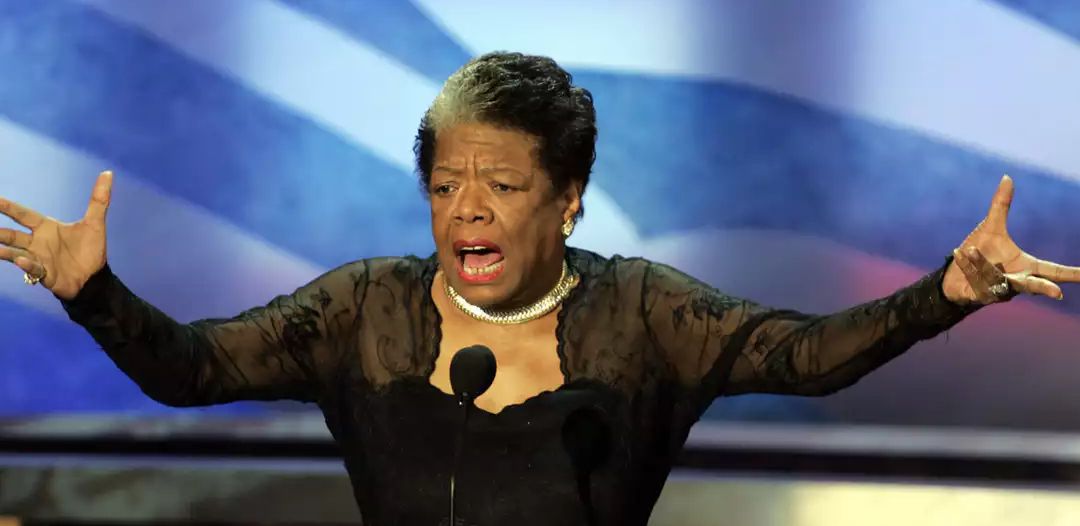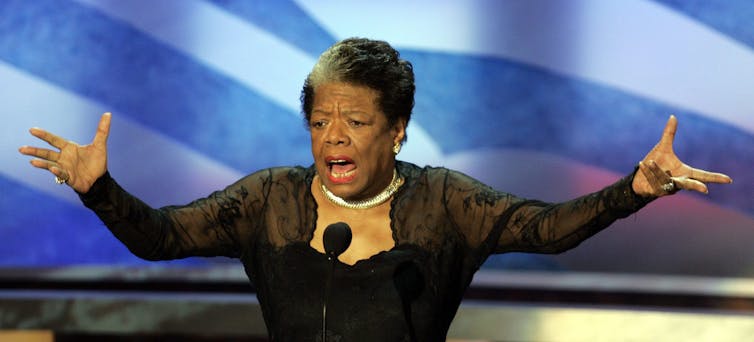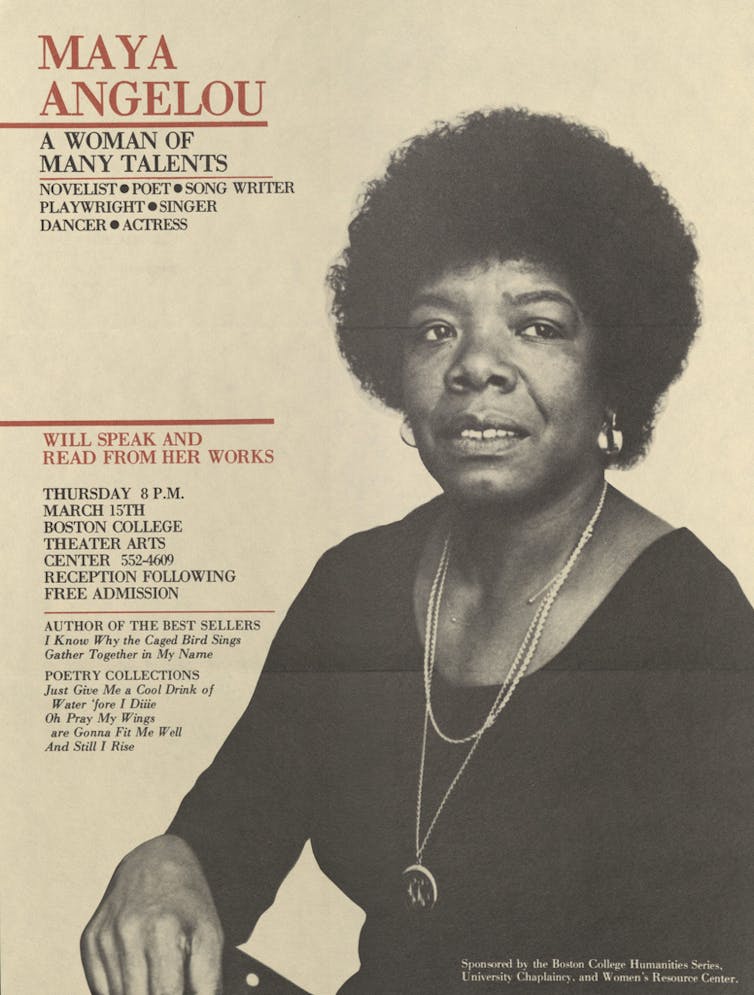
How Maya Angelou made me feel

EPA/ Matt Campbell
One of the many quotes from Maya Angelou that people are share is:
I’ve learned that people will forget what you said, people will forget what you did, but people will never forget how you made them feel.
My The Conversation colleague, Aaron Nyerges, has written a beautiful acknowledgement of Maya Angelou’s contributions as a poet, or as he states borrowing from Shelley, an “unacknowledged legislators of the world”. I want to acknowledge how Maya Angelou made me feel as a young black American woman, and how those feelings have defined how I experience myself as a complete human being.
I can honestly say that I actually felt Maya Angelou before I knew who she was. I was 17 years old and attending the Academy of Achievement’s Golden Plate Awards held in Chicago in 1989. I had walked to the ballroom where the keynote speakers, such as President Ronald Reagan, were to speak to those considered some of the top high school students in the United States. I opened the door, stood at the back, and instantly felt electricity go up my spine. I began to tremble. Within the first minute of her speech, I was overcome with tears.
I don’t remember what she said. All I remember is how the power of her presence – the warmth, the wisdom, the elegance, and the compassion – moved me in a way that I’d never responded to a person before. When she completed her speech, I fought my way through the crowd to meet her. Standing before her with tears streaming down my face, I blurted out, “Thank you for moving me.” I remember she took my hand in both of hers, smiled, and said: “Thank you, your response moves me.”
I vowed then that I would cultivate that kind of presence – that ability to move people’s souls. Her words have guided me on that journey by giving shape to my feelings.

Burns Library, Boston College
And Still I Rise
As Aaron Nyerges has pointed out, Maya Angelou’s poem And Still I Rise was published in 1978. I would have been six years old. Yet, I know the refrain from either my mother or my favourite Aunt reciting these words during our annual Kwanzaa celebrations, which is an African American holiday established by Maulana Karengal. Like a secular The Lord’s Prayer, every time that I experience the bitterness of institutional racism and anger threatens to close my heart, I whisper the words “And Still I Rise” and feel myself float above the fear and anger.
Phenomenal Woman
With dark skin, wide-nose, kinky-curly hair, and curvy hips, my ability to appreciate my own physical beauty is only due to a historical accident. I grew up steeped in the Black is Beautiful movement, which had reached its peak in the 1970s. As part of the Black Arts Movement, Maya Angelou’s Phenomenal Woman articulated in words the powerful images of beautiful black women who appeared on posters, magazine articles, and Blaxploitation films. Even now, I call upon those images to express my intellectual ideas, such as my QAME (questions, assumptions, methods, and evidence) Song music video.
On the Pulse of Morning
Aaron Nyerges concludes his acknowledgement with the poem On the Pulse of Morning that Maya Angelou performed for former President Bill Clinton’s 1993 Inauguration.
This poem is what reconfirmed my decision to become an anthropologist instead of a neuroscientist, which was my original intent when attending Bryn Mawr College. As a young black woman of academic promise, one is expected to become a medical doctor, lawyer, engineer, or educator in order to contribute back to the black community.
Choosing to become an anthropologist was a risk. When I watched her on TV call forth our connections to the trees, to the rivers, and most importantly to each other as human beings, I felt that I had made the right decision. That the path of anthropology would bring me closer to my need and responsibility to promote greater respect, understanding, and love among all people, minerals, plants, and animals.
The Way You Make Me Feel
Since the moment I first felt Maya Angelou, I have actively chosen paths that would cultivate my warmth, wisdom, elegance, and compassion. I am privileged to have stood in front of crowds of hundreds, and sometimes just one-to-one encounters, in which I have given people goosebumps, made them tremble with excitement, and even moved their soul to tears.
I acknowledge that Maya Angelou, by taking my hand in both of her hands, connected me directly to a little bit of the power of her presence. But she only gave me a spark. Every day I have to work hard in opening my heart to maintain it.
Thank you Mama Maya, my great ancestor. I will never forget how you made me feel. ![]()
Elizabeth Dori Tunstall, Associate Professor, Design Anthropology, Swinburne University of Technology
This article is republished from The Conversation under a Creative Commons license. Read the original article.
